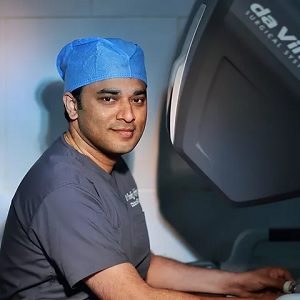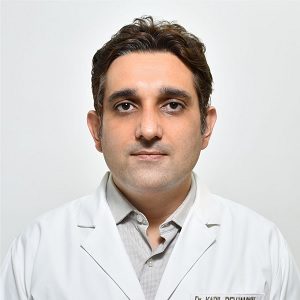Best Doctors in India for Hepatitis C treatment
- Liver Transplant Surgeon and HPB Surgeon, Chennai, India
- Over 15 years’ experience
Profile Highlights:
- Dr. Selvakumar Naganathan is one of the best liver transplant surgeons in India with nearly 15 years of experience.
- He has carried out more than 2000 procedures, including 300 donor & 500 recipient hepatectomies, cadaver transplantations, retrieval of cadaver livers, and live donor liver transplants.
- He also established many liver transplantation centers across India & other countries.
- General Surgeon and Surgical Gastroenterologist, Chennai, India
- Over 27 years’ experience
Profile Highlights:
- Dr. Raghunath K J is a well-known name in the field of general surgery with an experience of more than 27 years.
- He went under training in advanced Laparoscopic surgery from Canada and France.
- Dr. Raghunath pioneers many prestigious projects in the UK.
- Dr. Raghunath has a specialized interest in Gall Bladder Stone treatment, Hernia, GI Cancer Surgery, Laparoscopic Sleeve Resection, Endoscopic Surgery, etc.
- Colorectal Surgeon and Robotic Surgeon, Chennai, India
- Over 26 years’ experience
Profile Highlights:
- Dr. Venkatesh Munikrishnan is one of the best Gastroenterologists and Colorectal Surgeons in Chennai, having 21 years of experience in managing disorders that need surgical treatment.
- Dr. Munikrishnan specializes in surgical oncology, endoscopy, Gastritis Treatment, etc.
- He is also active in research; one of his research on CT Colonography fetched a grant from Bracco, Milan, Italy.
- GI Surgeon and Liver Transplant Surgeon, Gurugram, India
- Over 20 years’ experience
Profile Highlights:
- Dr. Amit Nath Rastogi is a pioneer in the field of liver transplant surgery. He completed his fellowship in liver transplant surgery at Sir Gangaram hospital while being a part of the largest liver transplant program in the country.
- Furthermore, he received his training in robotic liver surgery from IRCAD -Strasbourg, France, and advanced robotic HPB training from Grosseto.
- Liver Transplant Surgeon, Gurugram, India
- Over 10 years’ experience
Profile Highlights:
- Dr. Prashant Vilas Bhangui is one of the highly trained liver transplant specialists who received his training in Surgical Gastroenterology and Liver Transplantation.
- He also holds a European Inter-University Diploma in Hepato-Biliary-Pancreatic Cancers.
- Dr. Prashant is further interested to work in certain fields which include hepatocellular carcinoma, colorectal liver metastases, and living donor liver transplantation. Besides this, he has also published several journals on these subjects.
- Gastroenterologist, Gurugram, India
- Over 7 years’ experience
Profile Highlights:
- Dr. Abhinandan Mishra is one of the young Gastroenterology doctors in Gurugram who is particularly interested in inflammatory bowel disease treatment.
- Dr. Abhinandan Mishra offers Endoscopic Retrograde Cholangiopancreatography, Ascites tap, Endoscopy, Peroral Endoscopic Myotomy, Capsule Endoscopy, Esophageal Manometry, Magnetic Resonance Cholangiopancreatography, etc.
- Gastroenterologist, Gurugram, India
- Over 18 years’ experience
Profile Highlights:
- Dr. Atul Sharma is a renowned Gastroenterology practitioner in Gurugram and is particularly interested in Third Space Endoscopy and Per Oral Endoscopic Myotomy (POEM).
- He presented several papers on Manometry, Luminal gastroenterology, and interventional Gastroenterology during training in Advanced Interventional GI Endoscopy.
- Gastroenterologist, Gurugram, India
- Over 15 years’ experience
Profile Highlights:
- Dr. Kapil Jamwal is a renowned GI practitioner in Gurugram with an extensive experience in digestive and liver disease.
- The specialist offers treatment for Hepatitis B, Jaundice, Hepatitis C, Inflammatory Bowel Syndrome, Acute Pancreatitis, Liver Diseases, and Irritable Bowel Syndrome.
- Gastroenterologist, Gurugram, India
- Over 18 years’ experience
Profile Highlights:
- Dr. Rajesh Padhan is a renowned Gastroenterologist in Gurugram with an extensive experience of more than 18 years in the field.
- He is skilled in carrying out various endoscopy procedures such as Colonoscopy, Endoscopic retrograde cholangiopancreatography, Endoscopic ultrasound, upper GI endoscopy, etc.
- Gastroenterologist, Hepatologist, Gurugram, India
- Over 25 years’ experience
Profile Highlights:
- Dr. Sakshi Karkra is one of the best Pediatric gastroenterologists in Gurugram.
- She has special interest/ expertise in Colonoscopy, Upper GI Endoscopy, Capsule endoscopy, Enteroscopy, Endoscopic variceal ligation, Foreign body removal, Stricture & achalasia dilatation, Polypectomy, Anal manometry, Liver Biopsy, and Colonic manometry.
Best Hospitals in India for Hepatitis C treatment
Hepatitis C
Hepatitis C is a viral infection that causes inflammation in the liver. Sometimes, it may cause serious damage to the liver. The virus (HCV or hepatitis C virus) transmits through contaminated blood. Nearly 50 percent of the population is unaware of the fact that they are suffering from hepatitis C. This is mainly because the symptoms don’t appear until the infection advances. Most people suffering from liver disease undergo screening for hepatitis C.
Causes of Hepatitis C
Symptoms of Hepatitis C
Chronic hepatitis C is a long-term infection with the hepatitis C virus. Chronic hepatitis C virus is a silent infection that shows symptoms when the virus damages the liver that is serious enough to indicate signs of liver disease. Chronic hepatitis C infection begins with an acute phase. The doctor may not be able to diagnose acute hepatitis C as it doesn’t show symptoms early. When the signs & symptoms start appearing, they may include fever, fatigue, jaundice, muscle aches, and nausea.
The acute symptoms start appearing at least two months after exposure to the virus and may last for 14 days to almost 3 months. It does not necessarily turn to chronic infection. Some people relieve the hepatitis C virus in the acute phase itself from their bodies, the process known as spontaneous viral clearance. Nearly 25 percent of the people diagnosed with a ute hepatitis C virus cleared the virus off their bodies through spontaneous viral clearance. However, antiviral therapy is also effective for the clearance of the virus from the body. The symptoms of hepatitis C virus are:
- Yellow discoloration of the skin and the eyes.
- Drowsiness, confusion, and slurred speech.
- Easy bruising and bleeding
- Fluid buildup in the abdomen termed as ascites.
- Poor appetite
- Swelling in the legs
- Dark-colored urine
- Weight loss
- Fatigue
- Itchy skin
- Spider angiomas or spider-like blood vessels on the skin.
Screening for Hepatitis C
Doctors recommend all the people of the ages between 18 years to 79 years to undergo screening for hepatitis C. Even those who don’t show symptoms must undergo screening for hepatitis C. The screening for the hepatitis C virus is crucial for the people who are at a higher risk for exposure to the virus. The people may be:
- Health care and emergency workers exposed to blood or needle stick injuries while working
- People who got blood transfusions before 1992 or organs transplants during that period
- People who were in prison
- Anyone who injected on inhaled illicit drugs
- People with HIV infection
- People having abnormal liver function test results without any noticeable cause
- Anybody born between 1945 to 1965
- People with a history of long-term hemodialysis treatment
- Babies born to mothers suffering from hepatitis C infection
- Sexual partners of anybody diagnosed with hepatitis C
- People with hemophilia treated with clotting factors before 1987.
Other tests
Liver damage tests
- Magnetic Resonance Elastography (MRE) – This is a non-invasive alternative. It combines magnetic resonance imaging technology with the patterns of the sound waves bouncing off the liver to create visual maps that show gradients of stiffness throughout the liver. One may observe the presence of scarring of the liver, also called fibrosis, because of chronic hepatitis C if the liver tissue if stiff.
- Transient Elastography – This is another non-invasive test. It is a type of ultrasound that allows the transmission of vibrations into the liver. It measures the speed of the dispersal of the vibrations through the liver tissue to estimate the stiffness of the liver.
- Liver biopsy– Done under the ultrasound guidance, it involves the insertion of a thin needle through the wall of the abdomen. The doctor carries out this for the removal of a small sample of liver tissue to carry out laboratory testing.
- Blood tests- A number of blood tests show the extent of fibrosis in the liver.
Treatment Options of Hepatitis C
Antiviral medications
Your doctor will prescribe you the antiviral medications to treat hepatitis C infection in your body. These medications intend to remove the virus from your body. The main aim of the treatment is to have complete absence of the hepatitis C virus in your body at least 12 weeks after completion of the treatment. Now, there are significant advances in the treatment for hepatitis C virus infection. These advances involve the use of “direct-acting” antiviral medications which you need to take alone or in a combination with the existing treatments.
The new advances show better results with fewer side effects and short treatment time. Some of the treatments are as short as eight weeks. The hepatitis C genotype determines the choice of medications and the length of the treatment. Not just this, the existing liver damage, prior treatment, and other medical conditions are also a factor.
















